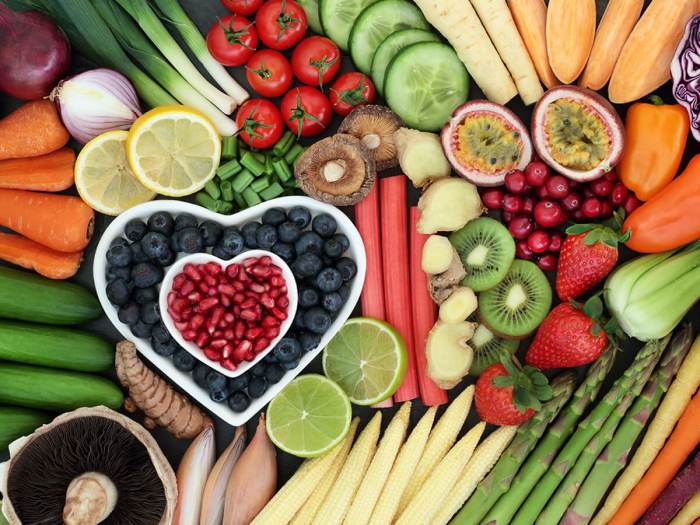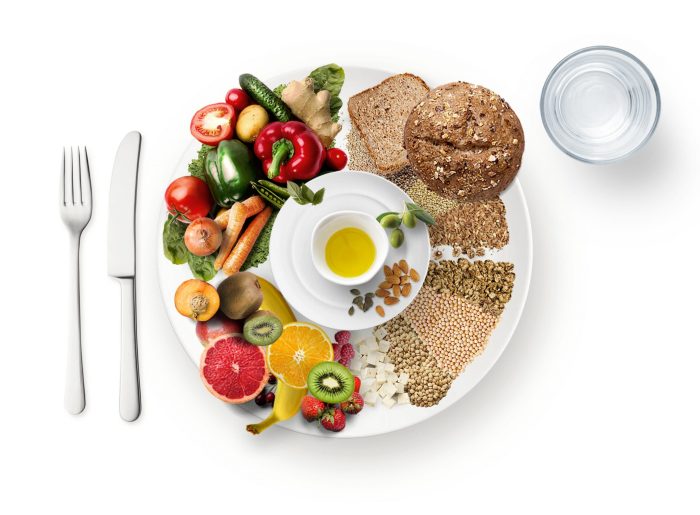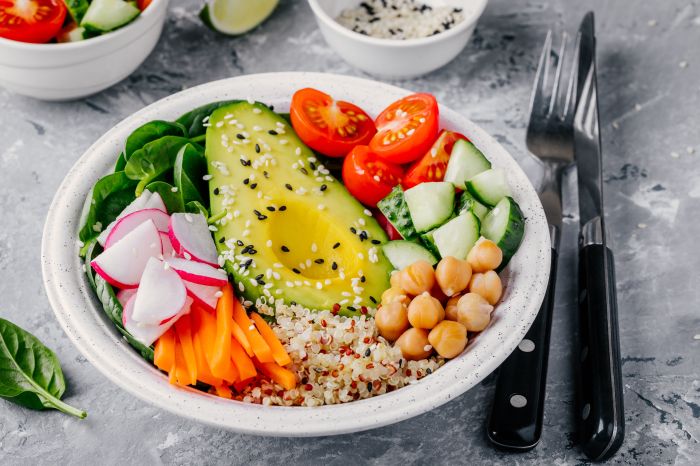How to eat healthy vegan – Embarking on a journey of healthy vegan eating can be an incredibly rewarding endeavor, unlocking a world of vibrant flavors and exceptional health benefits. Dive into the captivating realm of plant-based nutrition, where we’ll explore the fundamentals, challenges, and practical tips to guide you towards a thriving vegan lifestyle.
Introduction

Veganism, a plant-based lifestyle that excludes all animal products, is rapidly gaining popularity worldwide. Driven by concerns over health, environmental sustainability, and animal welfare, an increasing number of individuals are embracing veganism as a way to live a healthier and more compassionate life.
Statistics show that the global vegan population has grown exponentially in recent years. According to a 2022 study by the Vegan Society, the number of vegans in the UK alone has increased by 400% since 2014. In the United States, the number of vegans has grown by 600% in the past decade.
Defining Veganism
Veganism is a philosophy and lifestyle that seeks to exclude all forms of animal exploitation and cruelty. Vegans abstain from consuming any animal products, including meat, poultry, fish, eggs, dairy, honey, and any ingredients derived from animals.
Benefits of a Healthy Vegan Diet

Adopting a vegan diet offers numerous potential health benefits. Studies have consistently shown that plant-based diets can reduce the risk of chronic diseases, improve overall well-being, and promote longevity.
One of the key benefits of a vegan diet is its ability to reduce the risk of heart disease. Vegan diets are typically low in saturated fat and cholesterol, which are major contributors to the development of heart disease. Studies have shown that vegans have a lower risk of heart attacks, strokes, and other cardiovascular events compared to meat-eaters.
Reduced Risk of Certain Cancers
Research has also linked vegan diets to a reduced risk of certain types of cancer, including colorectal, breast, and prostate cancer. Plant-based foods are rich in antioxidants, fiber, and other protective compounds that may help protect against cancer development.
Improved Blood Sugar Control
Vegan diets are typically high in fiber, which helps to slow down the absorption of sugar into the bloodstream. This can help to improve blood sugar control and reduce the risk of developing type 2 diabetes.
Weight Management
Vegan diets can also be beneficial for weight management. Plant-based foods are typically lower in calories and fat than animal products, and they are more filling due to their high fiber content. This can help to promote weight loss and maintain a healthy weight.
Improved Mood and Cognitive Function
Some studies have suggested that vegan diets may also improve mood and cognitive function. Plant-based foods are rich in vitamins, minerals, and antioxidants that are essential for brain health. Additionally, vegan diets are typically lower in inflammatory compounds, which may also contribute to improved mood and cognitive function.
Challenges of Eating a Healthy Vegan Diet: How To Eat Healthy Vegan
Transitioning to a vegan lifestyle can present various challenges. Individuals may encounter nutrient deficiencies, social barriers, and cultural obstacles. Understanding these challenges and developing strategies to overcome them is crucial for a successful and sustainable vegan journey.
One of the primary challenges lies in ensuring adequate nutrient intake. Vegans must pay close attention to their vitamin B12, iron, calcium, and omega-3 fatty acid levels, as these nutrients are primarily obtained from animal products. Supplementation or consuming fortified foods can help address these deficiencies.
Social and Cultural Barriers
Social and cultural factors can also pose challenges for vegans. Misconceptions, prejudice, and limited vegan options in social settings can make it difficult to adhere to a vegan diet. Finding supportive communities, educating others about veganism, and preparing meals in advance can help overcome these barriers.
For those seeking a balance between a plant-based diet and seafood consumption, the pescatarian diet offers a unique approach. This dietary pattern emphasizes plant-based foods, including fruits, vegetables, whole grains, and legumes, while also incorporating fish and other seafood into the mix.
By prioritizing plant-based foods, pescatarians benefit from the health advantages associated with a high-fiber, nutrient-rich diet, while still enjoying the nutritional value of seafood.
Practical Tips for Eating Healthy Vegan
Embracing a healthy vegan diet requires mindful planning and effort. Here are practical tips to guide you on this transformative journey:
Meal Planning
Plan your meals in advance to ensure you consume a balanced and nutrient-rich diet. Consider the following steps:
- Variety is key:Include a wide range of fruits, vegetables, legumes, whole grains, and nuts in your meals.
- Protein balance:Combine protein sources such as beans, lentils, tofu, and tempeh to meet your daily protein needs.
- Consider fortified foods:Choose fortified plant-based milks, cereals, and nutritional yeast to supplement essential nutrients like vitamin B12 and calcium.
Grocery Shopping
Navigate grocery stores efficiently by following these tips:
- Read food labels:Check for hidden animal ingredients and ensure products are vegan-certified.
- Explore the produce section:Prioritize fresh fruits and vegetables for optimal nutrient intake.
- Stock up on legumes and grains:These nutrient-dense foods provide fiber, protein, and essential vitamins.
Cooking Vegan Meals
Transforming your kitchen into a vegan haven involves these cooking techniques:
- Experiment with spices and herbs:Enhance the flavor of your dishes without relying on animal products.
- Use plant-based substitutes:Vegan butter, cheese, and cream can provide similar textures and flavors.
- Master tofu preparation:Marinate, bake, or stir-fry tofu to create versatile and protein-rich dishes.
Sample Vegan Meal Plan
Designing a vegan meal plan can be easy and enjoyable. It is essential to include a variety of nutrient-rich foods from all food groups to ensure your body gets the essential nutrients it needs. Here’s a sample vegan meal plan for a day:
Breakfast
- Oatmeal with berries and nuts:Oatmeal is a good source of fiber and energy, while berries and nuts provide antioxidants and healthy fats.
- Tofu scramble with vegetables:Tofu is a good source of protein, and vegetables provide essential vitamins and minerals.
- Smoothie made with fruits, vegetables, and plant-based milk:Smoothies are a great way to get a variety of nutrients in one meal.
Lunch
- Lentil soup with whole-wheat bread:Lentil soup is a good source of protein and fiber, while whole-wheat bread provides complex carbohydrates.
- Salad with grilled tofu or tempeh, vegetables, and quinoa:Salads are a great way to get a variety of nutrients, and grilled tofu or tempeh provides protein.
- Vegan sandwich on whole-wheat bread with hummus, avocado, and vegetables:Sandwiches are a convenient and portable lunch option, and hummus and avocado provide healthy fats.
Dinner, How to eat healthy vegan
- Stir-fry with tofu or tempeh, vegetables, and brown rice:Stir-fries are a great way to get a variety of nutrients, and tofu or tempeh provides protein.
- Lentil shepherd’s pie with mashed potatoes:Lentil shepherd’s pie is a hearty and satisfying meal, and mashed potatoes provide complex carbohydrates.
- Vegan pasta with marinara sauce and vegetables:Vegan pasta is a good source of carbohydrates, and marinara sauce and vegetables provide essential vitamins and minerals.
Snacks
- Fruit:Fruit is a good source of vitamins, minerals, and fiber.
- Vegetables:Vegetables are a good source of vitamins, minerals, and fiber.
- Nuts and seeds:Nuts and seeds are a good source of healthy fats, protein, and fiber.
This is just a sample meal plan, and you can adjust it to fit your individual needs and preferences. It is important to listen to your body and eat when you are hungry, and stop when you are full. With a little planning, eating a healthy vegan diet can be easy and enjoyable.
Resources and Support for Vegan Eating
Adopting a vegan diet requires commitment and a shift in eating habits. Fortunately, there are numerous resources and support systems available to assist you on this journey.
For those looking for a dietary approach that combines the health benefits of a plant-based diet with the inclusion of seafood, the pescatarian diet offers a balanced solution. It’s a unique dietary pattern that emphasizes the consumption of fish and other seafood while excluding meat, poultry, and other animal products.
Online forums, social media groups, and dedicated websites provide a wealth of information on vegan nutrition, recipes, and ethical considerations. These platforms connect you with a community of like-minded individuals, offering encouragement and practical advice.
Websites and Online Resources
- The Vegan Society: Provides comprehensive information on veganism, including nutritional guidelines, recipes, and a directory of vegan products.
- Vegan Outreach: Focuses on educating the public about the benefits of veganism and promoting plant-based eating.
- Forks Over Knives: Offers a range of resources, including a documentary, cookbook, and online courses, to support a whole-food, plant-based diet.
Books
- How Not to Die: Discover the Foods Scientifically Proven to Prevent and Reverse Disease by Dr. Michael Greger
- The China Study: The Most Comprehensive Study of Nutrition Ever Conducted and the Startling Implications for Diet, Weight Loss, and Long-term Health by T. Colin Campbell, PhD, and Thomas M. Campbell II, MD
- Vegan for Life: Everything You Need to Know to Be Healthy and Fit on a Plant-Based Diet by Jack Norris, RD
Support Groups
- Local vegan meetups: Connect with vegans in your area for social support and recipe sharing.
- Online support groups: Join virtual communities where you can ask questions, share experiences, and find encouragement.
- Vegan mentors: Seek guidance from experienced vegans who can provide personalized support and advice.
Vegan Certification Programs
Vegan certification programs ensure the authenticity of vegan products by verifying that they meet specific standards. These programs help consumers identify products that are free from animal-derived ingredients, including hidden ingredients.
Look for products that carry reputable vegan certifications, such as:
- The Vegan Society’s Vegan Trademark
- Certified Vegan by the American Vegetarian Association
- Vegan Action’s Vegan Certification
Consulting a Healthcare Professional
Before making significant dietary changes, it’s essential to consult with a qualified healthcare professional. They can assess your individual needs, provide personalized guidance, and monitor your health as you transition to a vegan diet.
Closing Summary

Adopting a healthy vegan diet empowers you with the knowledge and tools to nourish your body and mind, while contributing to a more sustainable and compassionate world. Remember, this is a journey, not a destination. Embrace the learning process, experiment with new flavors, and connect with a community of like-minded individuals.
Together, we can unlock the transformative power of plant-based eating.
User Queries
Is a vegan diet restrictive?
While veganism eliminates animal products, it opens up a vast array of plant-based foods, including fruits, vegetables, whole grains, legumes, nuts, and seeds, providing a diverse and nutrient-rich dietary foundation.
Can I get enough protein on a vegan diet?
Absolutely! Plant-based sources like tofu, tempeh, lentils, beans, quinoa, and nuts are excellent sources of protein. By combining different plant-based foods throughout the day, you can easily meet your protein needs.
How do I ensure I’m getting enough essential nutrients on a vegan diet?
Planning and variety are key. Include a wide range of fruits, vegetables, whole grains, legumes, and fortified foods in your diet. Consider consulting with a registered dietitian or healthcare professional for personalized guidance.